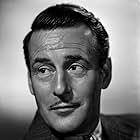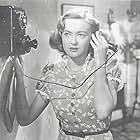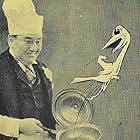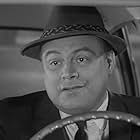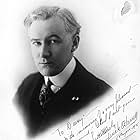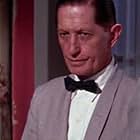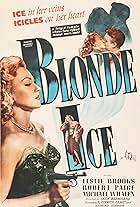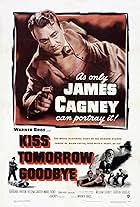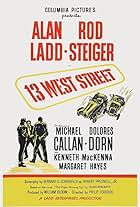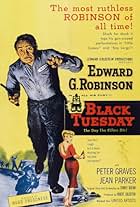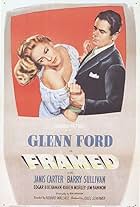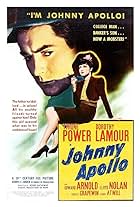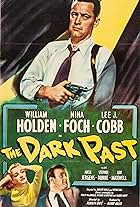IMDb RATING
5.5/10
1.4K
YOUR RATING
After beautiful Mary returns home to her "whistle stop" home town, long-standing feelings of animosity between two of her old boyfriends leads to robbery and murder.After beautiful Mary returns home to her "whistle stop" home town, long-standing feelings of animosity between two of her old boyfriends leads to robbery and murder.After beautiful Mary returns home to her "whistle stop" home town, long-standing feelings of animosity between two of her old boyfriends leads to robbery and murder.
Ewing Miles Brown
- Townsman
- (uncredited)
Jack George
- Joe - Barber Shop Customer
- (uncredited)
Robert Homans
- Sheriff
- (uncredited)
Broderick O'Farrell
- Barfly
- (uncredited)
Jeffrey Sayre
- Fran's Dance Partner
- (uncredited)
- Director
- Writers
- All cast & crew
- Production, box office & more at IMDbPro
Storyline
Did you know
- TriviaMack Gray, who plays the replacement bartender, was an old friend of George Raft and his film career consisted mostly of cameos in Raft films.
- Quotes
Josie Veech: Oh, sure, the best time to start looking for a job is 8 o'clock at night, and if you do a good job of looking, you won't get home 'til morning, and the best place for looking is every beer joint and pool hall on Main Street.
- ConnectionsEdited into Mobster Theater: Whistle Stop (2022)
- SoundtracksOnce Again
(uncredited)
Featured review
Whistle Stop (1946)
The style is pure film noir but the plot is not. A curious blend at the time of the first noirs at the end of WWII (this one is actually copyright 1945). It has two strong headliners, though some might argue this--George Raft is always a bit less than he wants to be and Ava Gardner is simply young and charming, before her great later roles. It does have a great idea--a beautiful woman has returned to the simple little town where she grew up wanting to see if her true love was still what she thought.
And so Gardner steps off the train at the whistle stop wearing furs, and mentioning her rich lovers left behind in Chicago. She looks at George Raft and thinks he's still a handsome guy, maybe it'll work. But she soon learns Raft is still a loser. And that another guy in town, with lots more money, still has the hots for her. It takes about one scene to switch her game plan.
It's called "Whistle Stop" because it's such a small town on the train line the train doesn't stop unless a signal is put out that a passenger is waiting. Then it blows its whistle and stops. (It also blew its whistle when it had a passenger, Gardner, who wanted to get off, so the whole town, if listening, would say, "Oh, the train's stopping." This becomes important later when Raft gets involved in a way to both make some quick major cash and get even with his rival.
But I should finally say the plot and direction are horribly put together. After awhile the four of us watching were speaking out, after a half hour of really rapt silence, saying, "What?" Or, "Now way." That is, the most improbable flip-flopping of emotions and inconsistent characters keeps adding up until you just can't quite get it. What's worse is it was all really avoidable with some minor thinking. You get the sense that maybe it got re-edited after shooting was done, maybe to create a different flow, or shorten it, or change the ending, and they just didn't have the pieces that needed to make it make sense. Whatever the reason, all these heartfelt, gritty, intense situations fall slightly flat. Just slightly--the movie is sort of watchable--but you have to like this period of movies to see all the great things going on otherwise.
Like the filming--great noir-ish darkness and high contrast, wonderful tight framing, and a few shots in a few scenes that you could study for their simple effectiveness. This is what keeps it going. And the whole scene is great, the little town, the back rooms and odd characters, the family at home. None of it is fully fleshed out, but it's all there to look at at least.
And a last point--the only copy I could find was streaming on Amazon, and it's a terrible print--there must be a hundred little gaps and jumps where both the sound and picture skip a second. Beware of that. Too. But Ava, well, she's got a career ahead of her, and she brings her scenes alive.
The style is pure film noir but the plot is not. A curious blend at the time of the first noirs at the end of WWII (this one is actually copyright 1945). It has two strong headliners, though some might argue this--George Raft is always a bit less than he wants to be and Ava Gardner is simply young and charming, before her great later roles. It does have a great idea--a beautiful woman has returned to the simple little town where she grew up wanting to see if her true love was still what she thought.
And so Gardner steps off the train at the whistle stop wearing furs, and mentioning her rich lovers left behind in Chicago. She looks at George Raft and thinks he's still a handsome guy, maybe it'll work. But she soon learns Raft is still a loser. And that another guy in town, with lots more money, still has the hots for her. It takes about one scene to switch her game plan.
It's called "Whistle Stop" because it's such a small town on the train line the train doesn't stop unless a signal is put out that a passenger is waiting. Then it blows its whistle and stops. (It also blew its whistle when it had a passenger, Gardner, who wanted to get off, so the whole town, if listening, would say, "Oh, the train's stopping." This becomes important later when Raft gets involved in a way to both make some quick major cash and get even with his rival.
But I should finally say the plot and direction are horribly put together. After awhile the four of us watching were speaking out, after a half hour of really rapt silence, saying, "What?" Or, "Now way." That is, the most improbable flip-flopping of emotions and inconsistent characters keeps adding up until you just can't quite get it. What's worse is it was all really avoidable with some minor thinking. You get the sense that maybe it got re-edited after shooting was done, maybe to create a different flow, or shorten it, or change the ending, and they just didn't have the pieces that needed to make it make sense. Whatever the reason, all these heartfelt, gritty, intense situations fall slightly flat. Just slightly--the movie is sort of watchable--but you have to like this period of movies to see all the great things going on otherwise.
Like the filming--great noir-ish darkness and high contrast, wonderful tight framing, and a few shots in a few scenes that you could study for their simple effectiveness. This is what keeps it going. And the whole scene is great, the little town, the back rooms and odd characters, the family at home. None of it is fully fleshed out, but it's all there to look at at least.
And a last point--the only copy I could find was streaming on Amazon, and it's a terrible print--there must be a hundred little gaps and jumps where both the sound and picture skip a second. Beware of that. Too. But Ava, well, she's got a career ahead of her, and she brings her scenes alive.
- secondtake
- Aug 4, 2012
- Permalink
- How long is Whistle Stop?Powered by Alexa
Details
- Runtime1 hour 25 minutes
- Color
- Aspect ratio
- 1.37 : 1
Contribute to this page
Suggest an edit or add missing content














